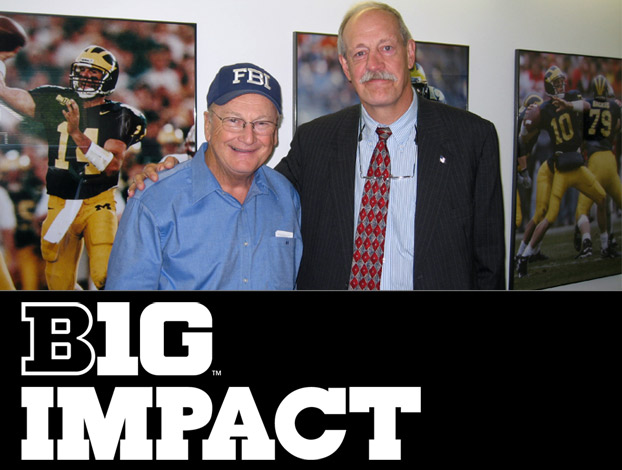
Courtesy Nebraska Alumni Association
Greg Stejskal, 1974 UNL Law grad and a retired 30-plus year veteran of the FBI, spearheaded a landmark investigation into steroid distribution called Operation Equine.
The probe, which spread across the United States and reached into Canada and Mexico from 1989 to 1993, led to more than 70 steroid trafficking convictions and exposed such athletes as Jose Canseco and Mark McGwire as users of steroids.
Stejskal had warned Major League Baseball (MLB) about its growing steroid problem in 1994, but the information fell on deaf ears.
HERE IS STEJSKAL’S PERSPECTIVE:
Almost 25 years ago, I met with the University of Michigan football coach Bo Schembechler to discuss a concern he had. I had come to know Schembechler through making presentations to Michigan's football teams since 1982 regarding issues such as sports gambling. His concern was the increasing use of steroids by football players.
Schembechler was not only concerned about college players, but also the high school players he was seeing in the University of Michigan’s summer instructional camp. When I met with the coach, Mike Gittleson, Michigan's strength coach, was also present. Schembechler knew the sale and possession of steroids had recently been made a felony under federal law. He wanted to know what was being done to enforce the law. I told him I didn’t know, but that I would find out.
What I learned was that nothing was being done.
I decided to propose a limited undercover (UC) operation. I pitched the proposal to the drug unit at FBI headquarters, but they were less than enthusiastic. They were not convinced steroids were the drugs they should be targeting.
Ultimately, I got approval from the unit that investigated fraud against the government. I argued that the steroids dealers were circumventing FDA regulations, as steroids were a prescription drug. (My Crim Law prof would have been proud.) We still prosecuted the dealers under the federal narcotics statutes.
During the course of our UC operation, there was a reluctance to pursue our case. With the exception of the official who authorized the investigation, Assistant U.S. Attorney Mike Leibson, FBI administrators and prosecutors didn’t view steroids as being a serious problem. Leibson understood the severity of the problem and supported the operation from the very beginning to the end of the prosecution phase, a total of more than five years.
A LOCAL INITIATIVE GOES GLOBAL
The case was originally planned to only be a local initiative. After starting slowly, it became an international case resulting in more than 70 trafficking convictions and the seizure of more than 10 million dosage units of steroids.
Partially as a result of one of the cases in Canada in which we worked extensively with the Royal Canadian Mounted Police, Canada's Parliament changed the statutes governing steroids to include veterinary steroids. We code-named our case Operation Equine because it was veterinary steroids for horses that were and continue to be popular as illicit performance-enhancing drugs with human athletes.
One of the subjects we prosecuted was Curtis Wenzlaff, a supplier to several MLB players. The best venue to charge Wenzlaff would have been the Northern District of California, where he was residing and where we had consummated the buys.
That District’s U.S. Attorney’s office refused to prosecute him in 1992, as they didn’t view steroid dealing as a serious offense. Later that same district would prosecute the case of the Bay Area Laboratories Co-Operative, or BALCO, for steroid trafficking. Apparently their view of steroids had changed.
ONCE A NONSTARTER, STEROIDS GETS SERIOUS
In August 1994, after the UC portion of our case had concluded, I shared the information we had learned from Wenzlaff about steroid use in MLB with the MLB's senior vice president for security, Kevin Hallinan. Hallinan indicated he had some knowledge of the steroid problem, but because the players could not be tested under their contract, he didn’t think there was much that MLB could do about it.
Among Wenzlaff’s customers were Jose Canseco and Mark McGwire, two players who were then playing for the Oakland A's. Wenzlaff not only provided them with steroids, he counseled them on which steroids to use and in what amounts.
In 2005, McGwire refused to answer questions regarding steroid use in front of Congress. In October 2009, the St. Louis Cardinals organization announced it was hiring McGwire as its batting coach. Many people, including me, publically voiced concerns that hiring McGwire sent the wrong message regarding MLB and steroids.
Finally, in January 2010, McGwire admitted extensive and long-term use of steroids and human growth hormones, including during the period in which he broke Roger Maris’ single season record for home runs.
All of us who were involved in Operation Equine take pride in what we accomplished. We overcame many obstacles to develop an unprecedented UC operation that is still the most successful case of its kind.